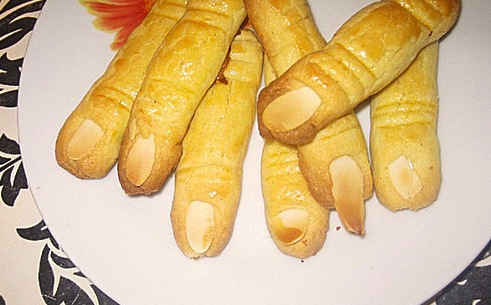Has Halloween become a German Celebration?

We all know that Halloween has for sure originated in America, it’s celebrated since a very long time. But as we cannot deny that many “American lifestyles” have entered Germany especially in the fast food sector such as Mc Donalds, Burger King, and Subway. It came in with foods like Marshmallows, Oreo Cookies and basically almost any US snack that you can purchase online in Germany – Little USA World –
Even the very typical US commercial sales event Black Friday is part of the German culture now. What do you know? This day has become the most shopping event in entire Germany! And it happens exactly after the USA holiday Thanksgiving…
To be precise Black Friday has become a shopping day in many other countries too. The photo below shows the retail increase in percentage. Why, you might ask? Well, I think we shall buy many things that we don’t really need. (source)

Let’s return to Halloween and ask the most pressing question:
Has Halloween become a typical German Celebration?
Polls show that 48% of Germans over the age of 35 feel that Halloween is not really part of the German culture and for many more the commercial aspect of this celebration is against their standards. Now the Germans below the age of 35 are embracing the American way of celebrating Halloween and like the commercial side of it. This makes you think that it has become quite a German tradition adapted from the USA. Let’s see how it all began
Typical German Celebrations – A Brief History
A typical German fall/autumn celebration would be the making of the so called “Rübengeister”. It has nothing to do with Halloween.
In my childhood we would carve fodder beets in fall shortly after the beets had been harvested. These beets served as feed for farm animals. In the villages and towns the children are doing a parade with these beet ghosts, It’s a local celebration in some regions of Germany, Austria and Switzerland. But the children would not be dressed up.

Saint Martin Celebration
In the Rhineland on November 11 there are many parades and often accompanied by the so called “Martinsfackeln” that are lanterns which are carved out of the fodder beets. It’s a religious tradition, and goes back to the holy Martin from Tours. It goes without saying that nobody is walking around in costumes.
Traditional Food
A traditional food specialty would be the “Weckmann”. It’s a sweet bread formed to a figure that has a clay pipe in the mouth and raisin eyes. You can buy it in any bakery or make it from scratch:
– Find the RECIPE For the Weckmann –
Another typical food specialty is the “Martinsgans”. It’s roasted goose served with red cabbage and dumplings. – Find the Recipe for the Martinsgans here – The recipe gives you more details about the St. Martin tradition.

How did Halloween Come to Germany?
You might not know this but it started in 1991 with the Gulf war. Now you may ask what has the gulf war to do with Halloween? As you might know German Karneval starts every November, and so it did in 1990. But in January 1991 USA launched the Operation Desert Storm and entered Iraq occupied Kuwait. As a result the German government under Helmut Kohl cancelled all German Karneval/Fasching celebrations in agreement with all Karneval societies, which was a devastating thing to do as it was a huge business for the costume industry.
“As reported in Spiegel, the spirit of joy and celebration associated with Karneval seemed at odds with the bombs being dropped on Iraq during the Gulf War.”
I just asked myself when I read the article (see below the link), what has Iraq to do with Germany?
“After the Gulf War cancelled festivities, these Karneval toymakers eventually banded together to think up ways to recoup lost revenue.”
The German toy and novelty retailer association decided that there must be a substitute and they implemented Halloween. It’s that easy. You might think, that doesn’t make sense, and yes, you are correct, it doesn’t make sense.
With the help of marketing the association managed that by 1994 Halloween was part of the German culture.
As of today the Halloween sales are only topped by Easter and Christmas sales. So Halloween makes the 3rd place in sales for costumes, candy and decorations with more than 200 Mio Euros in 2014. It grew rapidly from 160 Mio Euros in 2008.
Source
HALLOWEEN FOOD that Made its Way to Germany
Trick or Treat in Germany is : Süsses oder Saures? Sweet or sour? Very popular in the Rhineland and Berlin. 84% pf the population is celebrating halloween. But in trditional and conservative Bavaria it’s not t
The oldest and most revered Halloween event in Germany takes place at Burg Frankenstein near Darmstadt. There are more notable Halloween events that happen annually in Germany. There is a huge festival called the Movie Park Horror Fest that is ongoing since 1998 and happens in the North of Essen.
Because of a protestant holiday, Reformationstag, on October 31, in many German states like Bremen, Hamburg, Niedersachsen and Schleswig-Holstein, Halloween is additionally a day off as well! That fits perfectly.
In the South of Germany there was at first some resistance against Halloween but it faded away with the years, as you can see in the video that shows a big Halloween Park in the Allgäu, Bavarias biggest entertainment park in full Halloween decoration.
German Halloween Food
With all the costumes and decorations new German recipes for Halloween food came about. It’s good Halloween party food the German way. Find some specialties below.
Typical German Halloween Food Specialties
If you like to try one of those German Halloween recipes use the search function or click on the photo below:

Is Halloween really so popular? A little Insight to History, Culture & More…
picture credit Beet ghost
















